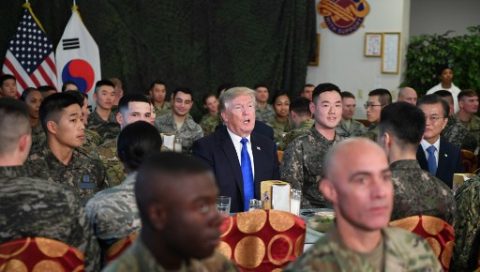
by Jerome Cartillier
Agence France Presse
SEOUL, South Korea (AFP) — North Korea poses a worldwide threat that needs worldwide action, President Donald Trump said in Seoul Tuesday, but insisted “we are making a lot of progress” in reining in the rogue state.
The US leader, standing alongside his South Korean counterpart Moon Jae-In, reiterated he was prepared to use the full range of American military might to halt Pyongyang’s march towards becoming a full-fledged nuclear power.
But he added: “It makes sense for North Korea to come to the table to make a deal that is good for the people of North Korea and the people of the world.”
Trump’s tone in Seoul, whose 10 million inhabitants would find themselves on the front line of any conflict, was in marked contrast to previous rhetoric.
Only a day earlier, Trump had declared in Tokyo on the first leg of his Asia tour that the time was over for “strategic patience” with Pyongyang, which in September carried out its most powerful nuclear test to date.
Trump has traded personal insults and threats of war with North Korean leader Kim Jong-Un, raising fears of possible US military action and rapid escalation.
But in the South Korean capital, just 35 miles south of the Demilitarized Zone that divides the peninsula, the US president was reassuring.
“Ultimately, it will all work out,” he said. “It always works out. It has to work out.”
North Korea, he said, was “a worldwide threat that requires a worldwide action,” but added: “I think we are making a lot of progress.”
Chinese President Xi Jinping — whom he has often described as holding the key to disarming the North — has been “very, very helpful,” he said, expressing hopes Russia would be similarly co-operative.
Trump goes on China Wednesday after addressing the South Korean parliament.
“We are going to have an exciting day tomorrow for many reasons that people will find out,” he said at a state dinner Tuesday night, without elaborating.
Trump arrived from Japan, where he secured Tokyo’s full support for Washington’s stance that “all options are on the table” regarding Pyongyang, and declared its nuclear ambitions “a threat to the civilized world and international peace and stability.”
He enjoyed three days of near-bromance with Prime Minister Shinzo Abe, calling him “wonderful” after a round of golf and describing US-Japan ties as “really extraordinary.”
After a relaxed few days in Tokyo, Seoul is a more complicated stop for the mercurial US president.
Trump’s relationship with the liberal-leaning Moon has been cool, and the former real estate magnate has railed at South Korean moves to engage its neighbor — something he has previously labelled “appeasement.”
But he described Moon as a “fine gentleman” in a tweet early Tuesday.
“The partnership between our two nations and our two people is deep and enduring,” Trump added at the dinner.
And Moon — whose parents were evacuated from the North on a US ship during the Korean War — was full of praise for the United States at Camp Humphreys, where US forces stationed in the country — 28,500 in total — have moved their headquarters from downtown Seoul.
“They say one knows a true friend when one is in need,” he told Trump. “The United States is a true friend who has been with us and has bled with us in our time of need.”
‘Thrice-cursed’
South Korea is rolling out the red carpet for Trump as it seeks assurances about the alliance and US resolve.
At the dinner Moon mentioned the first anniversary Wednesday of Trump’s election victory and said that after a day in his company, he felt “as if they were old friends.”
But while Trump has threatened Pyongyang with “fire and fury,” Moon is mindful that much of Seoul is within range of the North’s artillery and in an address to parliament last week demanded: “There should be no military action on the peninsula without our prior consent.”
Kim Hyun-Wook, a professor at the Korea National Diplomatic Academy, told AFP the two allies have “subtle differences in their positions” and underlying suspicions about each other.
Citizens’ views are mixed, with both pro- and anti-Trump demonstrations in downtown Seoul since the weekend. A heavy police presence lined the route of his motorcade Tuesday.
North Korea itself welcomed Trump to the region with a rhetorical volley via the ruling party newspaper Rodong Sinmun, calling the US a “thrice-cursed nuclear criminal” and condemning “Trump’s mad remarks.”
Commerce was also on Trump’s agenda in Seoul, and he demanded a “free, fair, and reciprocal” trade deal with his security ally, calling their existing agreement “quite unsuccessful and not very good for the United States.”
His administration has caused consternation in Seoul by demanding the renegotiation of the five-year-old US-Korea free trade agreement, which Trump has called a “horrible deal” and a “job killer.”
Trump’s visit will not include a trip to the Demilitarized Zone.
Some observers have fretted that a gaffe by a president given to off-the-cuff remarks could send tensions rising on the peninsula.
“If Trump says anything that can provoke North Korea, it could send military tensions soaring again,” said professor Koo Kab-Woo from the University of North Korean Studies in Seoul.
© Agence France-Presse








